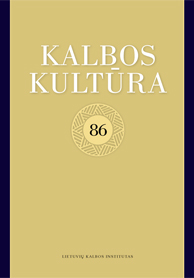DĖL DARINIŲ SU BAIGMENIU -EIVIS, -Ė
ON THE DERIVATIVES WITH THE ENDING -EIVIS, -Ė
Author(s): Jolanta VaskelienėSubject(s): Theoretical Linguistics, Morphology, Lexis, Semantics, Baltic Languages
Published by: Lietuvių Kalbos Institutas
Keywords: derivational method; derivational category; derivational type; ending; suffix; synonymity;
Summary/Abstract: In the Lithuanian language, there are four main types of word derivation: suffixation, prefixation, paradigmation, and composition. There are cases when two types of derivation occur at the same time: prefixation and suffixation, composition and suffixation, therefore, there is a mixed type of derivation. The nouns are derived using all types of word derivation, especially by means of suffixation. According to derivational meaning, the derivatives are classified into derivational categories. There are 13 categories of noun derivation, which have a certain number of types. Often there are different types of derivation in the same derivational category, which are composed (formally) with the same suffix, but different endings, e.g. -ėžis, -ė and -ėžius, -ė, -lys, -ė and -la, -ėlis, -ė and -ėla. There are derivatives naming persons, which have similar endings: -eiva and -eivis, -ė. The derivatives with the suffix -eiva are mentioned in the writings on word formation, and the derivatives with -eivis, -ė are scarcely mentioned. The object of the research is the nouns ending in eivis, -ė. The aim of the paper is to discuss the semantic and derivational particularities of derivatives ending in -eivis, -ė. To achieve the aim the following objectives have been set up: from the scientific literature to collect and present the data about the suffix / ending –eiva and -eivis, -ė; from Dictionary of the Lithuanian Language, Dictionary of Modern Lithuanian, headwords of Dictionary of Standard Lithuanian, Digital Supplement Catalogue of the Lithuanian Language Dictionary to collect the names of persons with the ending -eivis, -ė, to supplement them with the data from Database of Lithuanian Neologisms and the Corpus of the Contemporary Lithuanian Language, to discuss the semantics and derivation of derivatives ending in -eivis, -ė.
Journal: Bendrinė kalba (iki 2014 metų – Kalbos kultūra)
- Issue Year: 2019
- Issue No: 92
- Page Range: 1-16
- Page Count: 16
- Language: Lithuanian

